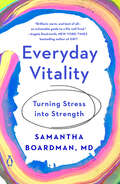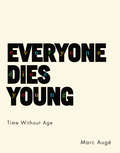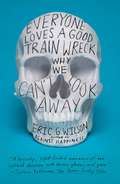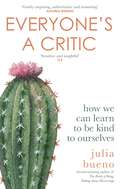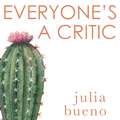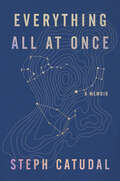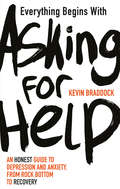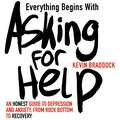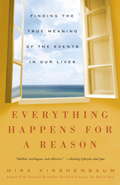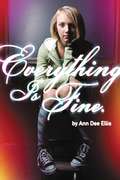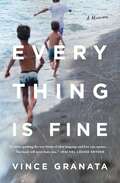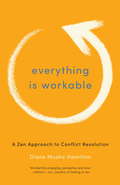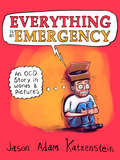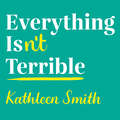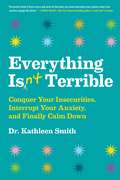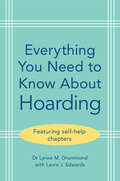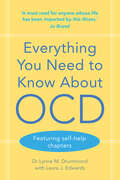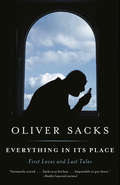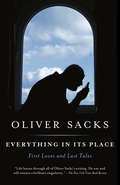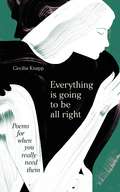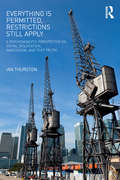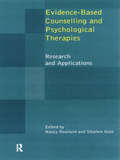- Table View
- List View
Everyday Vitality: Turning Stress into Strength
by Samantha Boardman&“If you would like to live a more fulfilled life, Samantha Boardman has exactly what you need. Everyday Vitality is one part memoir, one part wisdom from years of experience as a psychiatrist, and one part cutting edge scientific evidence. Brilliant, warm, and best of all—an actionable guide to a life well-lived.&”—Angela Duckworth, New York Times bestselling author of Grit: The Power of Passion and Perseverance Science-backed, research-driven, actionable strategies for countering stress and building your resilience &“A great deal of everyday wellbeing lies beyond what is happening inside a person&’s head. Everyday opportunities and activities that foster growth and build positive resources are not 'icing on the cake,' but the active ingredients of everyday resilience.&” —Samantha Boardman, Everyday VitalityIn Everyday Vitality, psychiatrist Dr. Samantha Boardman shows readers how to find strength within their stress and how to transform full days into more fulfilling days. Drawing from scientific research and her own clinical experience, she shares strategies for cultivating vitality—the positive feeling of aliveness and energy that lies at the core of well-being and at the heart of a good day. You will discover how increased vitality boosts productivity, builds coping skills, and enhances your ability to manage negative emotions. Dr. Boardman demonstrates how to override counterproductive responses to the onslaught of daily hassles and to respond with flexibility and fortitude instead of fear and rumination. Rather than disengaging from the world while you "find yourself," she shows you how to boost your vitality by living well within the world. As Dr. Boardman explains, the three main wellsprings of vitality are: meaningfully connecting with others; engaging in experiences that challenge you; and contributing to something beyond yourself. These activities foster resilience by boosting emotional stamina and generating uplifts—the counterparts to daily irritations and annoyances. Whether it is having a good conversation, doing a favor for someone, going for a walk, or reading an interesting article and then calling a friend to talk about it, commonplace experiences and micromoments serve as the building blocks of everyday resilience. Everyday Vitality explains how to identify them in your life, develop them, and use them as a foundation on which to thrive. Whether you are twenty or eighty, Everyday Vitality will give you the tools you need to get the most out of each day and to live your life to the fullest.
Everyone Dies Young: Time Without Age (European Perspectives: A Series in Social Thought and Cultural Criticism)
by Marc Augé"We are awash in time, savoring a few moments of it; we project ourselves into it, reinvent it, play with it; we take our time or let it slip away: it is the raw material of our imagination. Age, on the other hand, is the detailed account of the days that pass, the one-way view of the years whose total sum when set forth can stupefy us. Age wedges each of us between a date of birth that, at least in the West, we know for certain and an expiration date that, as a general rule, we would like to defer. Time is a freedom, age a constraint."Marc Augé remembers his beloved childhood cat, who seemed to grow wise with age, though her essential nature remained unchanged. He considers our belief that objects mature, when it is our perception of them that evolves over time. He wonders why public demonstrations of affection between the elderly make the young so uncomfortable and why we torture ourselves with regret at what might have been. Time can be liberating, he finds; it is a resource we can squander or relish. Yet age is a burden, bound by our personal and cultural neuroses. With an ethnologist's understanding of construct and practice, Augé isolates age from the development of consciousness, desire, and representations of the self. In bold, eye-opening strokes, he casts age as a physical marker and treats one's youthful approach to the world as the true measure of life's value.
Everyone Loves A Good Train Wreck: Why We Can't Look Away
by Eric G. WilsonWhy can't we look away? Whether we admit it or not, we're fascinated by evil. Dark fantasies, morbid curiosities, Schadenfreude: as conventional wisdom has it, these are the symptoms of our wicked side, and we succumb to them at our own peril. But we're still compelled to look whenever we pass a grisly accident on the highway, and there's no slaking our thirst for gory entertainments like horror movies and police procedurals. What makes these spectacles so irresistible? In Everyone Loves a Good Train Wreck, the scholar Eric G. Wilson sets out to discover the source of our attraction to the gruesome, drawing on the findings of biologists, sociologists, psychologists, anthropologists, philosophers, theologians, and artists. A professor of English literature and a lifelong student of the macabre, Wilson believes there's something nourishing in darkness. To repress death is to lose the feeling of life, he writes. A closeness to death discloses our most fertile energies. His examples are legion and startling in their diversity. Citing everything from elephant graveyards and Susan Sontag's On Photography to the Tiger Woods sex scandal and Steel Magnolias, Wilson finds heartening truths wherever he confronts death. In Everyone Loves a Good Train Wreck, the perverse is never far from the sublime. The result is a powerful and delightfully provocative defense of what it means to be human - for better and for worse.
Everyone's a Critic: How we can learn to be kind to ourselves
by Julia BuenoDo you beat yourself up after making a mistake? Do you treat yourself worse than you would a good friend?If these questions strike a chord, it's likely that you contend with unhealthy self-criticism. This mental habit is the cause of so much emotional suffering, and lies at the root of most of the problems that psychotherapists and counsellors encounter.In Everyone's a Critic, psychotherapist Julia Bueno shares seven case studies, inspired by her practice. They explore some of the reasons why we learn to turn against ourselves, encourage readers to be more curious about their self-critic, and inspire a practice of greater self-compassion instead.Praise for Everyone's a Critic:'Julia Bueno explores such an important topic, and one that holds so many people back: our inner critic. This book discusses where it may come from and, through case studies, how we can rewrite the script. Gently enquiring, authoritative and reassuring.' Annalisa Barbieri, Guardian'A quiet revelation: an investigation into the lacerating self-criticism many of us unleash upon ourselves without even being aware of it. One thinks, feels and learns. A compelling and important book.' Hannah Betts]'This is most certainly not a self-help book to beat yourself up with. Julia Bueno explains how self-criticism affects many of us and digs far deeper than the usual social-media-blaming... It's an important, timely book that many will benefit from reading and acting upon.' Louise Chunn, founder of therapist-matching site Welldoing'If you've ever felt that little voice - or a very loud one - at the back of your mind telling you you're no good, Julia Bueno's book is the ideal way to answer back.' Harry Mount, editor of the Oldie
Everyone's a Critic: How we can learn to be kind to ourselves
by Julia BuenoDo you beat yourself up after making a mistake? Do you treat yourself worse than you would a good friend?If these questions strike a chord, it's likely that you contend with unhealthy self-criticism. This mental habit is the cause of so much emotional suffering, and lies at the root of most of the problems that psychotherapists and counsellors encounter.In Everyone's a Critic, psychotherapist Julia Bueno shares seven case studies, inspired by her practice. They explore some of the reasons why we learn to turn against ourselves, encourage readers to be more curious about their self-critic, and inspire a practice of greater self-compassion instead.Praise for Everyone's a Critic:'Julia Bueno explores such an important topic, and one that holds so many people back: our inner critic. This book discusses where it may come from and, through case studies, how we can rewrite the script. Gently enquiring, authoritative and reassuring.' Annalisa Barbieri, Guardian'A quiet revelation: an investigation into the lacerating self-criticism many of us unleash upon ourselves without even being aware of it. One thinks, feels and learns. A compelling and important book.' Hannah Betts]'This is most certainly not a self-help book to beat yourself up with. Julia Bueno explains how self-criticism affects many of us and digs far deeper than the usual social-media-blaming... It's an important, timely book that many will benefit from reading and acting upon.' Louise Chunn, founder of therapist-matching site Welldoing'If you've ever felt that little voice - or a very loud one - at the back of your mind telling you you're no good, Julia Bueno's book is the ideal way to answer back.' Harry Mount, editor of the Oldie
Everything All at Once: A Memoir
by Stephanie CatudalNew York Times Bestseller An intimate and evocative memoir one woman’s experience with the universality of grief and the redemptive power of love as she endures her husband’s 84-day battle with lung cancer.When Steph Catudal met her husband Rivs, she thought that the love, stability, and warmth she shared with her husband had finally dispelled her pent-up anger and grief over the loss of her father and her faith. But when Rivs became ill and was put into coma at the height of the pandemic, the painful memories of her childhood—watching her father die of cancer—came flooding back.Written with lush lyricism, Steph’s account of how this crisis forced her to confront her past is raw, illuminating, and heartbreaking: her father’s death that wrecked her faith in God and jumpstarted a decade of rebellion, including running away from home and living out of a van at age 16, struggling with alcoholism, and delving into drugs to ease her pain. Sitting by Rivs's bedside, she grappled with the memories of the past and the uncertainties of the future while reckoning with the unknowns of her husband’s illness. Rivs would endure a grueling 84 days in a medically induced coma, eventually undergoing chemo for a similar illness that stole her father.Like Cheryl Strayed’s Wild, and Michelle Zauner’s Crying in H Mart, Everything All At Once is a heart-wrenching and ultimately uplifting reflection on resilience and a powerful reminder that we can find healing no matter how broken we are.
Everything Begins with Asking for Help: An honest guide to depression and anxiety, from rock bottom to recovery
by Kevin BraddockAn honest guide to depression and anxiety, from rock bottom to recovery, from someone who has been through it and come out the other side. Everything Begins with Asking for Help is a frank, insightful and thought-provoking book on mental health, drawing on the author's own experience of a severe mental breakdown and sharing the recovery tools he has developed in partnership with various medical professionals and mental health experts. Kevin shares his own story to give the book a vital human element, explaining how his fast-paced life in Berlin as a successful magazine journalist was brought to a sudden halt by a major depressive episode. In this dark time, Kevin reached out to friends for help, and it was that act - asking for help - that set him on the long road to recovery. Building on this narrative, Kevin leads the reader through the stages of asking for help, learning to listen, the physical, emotional and mental elements of recovery, and how to maintain stable mental health at home and at work. Written with warmth, honesty and compassion, this is is a valuable resource for anyone who needs help and doesn't know where to begin.
Everything Begins with Asking for Help: An honest guide to depression and anxiety, from rock bottom to recovery
by Kevin BraddockAn honest guide to depression and anxiety, from rock bottom to recovery, from someone who has been through it and come out the other side. Everything Begins with Asking for Help is a frank, insightful and thought-provoking book on mental health, drawing on the author's own experience of a severe mental breakdown and sharing the recovery tools he has developed in partnership with various medical professionals and mental health experts. Kevin shares his own story to give the book a vital human element, explaining how his fast-paced life in Berlin as a successful magazine journalist was brought to a sudden halt by a major depressive episode. In this dark time, Kevin reached out to friends for help, and it was that act - asking for help - that set him on the long road to recovery. Building on this narrative, Kevin leads the reader through the stages of asking for help, learning to listen, the physical, emotional and mental elements of recovery, and how to maintain stable mental health at home and at work. Written with warmth, honesty and compassion, this is is a valuable resource for anyone who needs help and doesn't know where to begin.
Everything Begins with Asking for Help: An honest guide to depression and anxiety, from rock bottom to recovery
by Kevin BraddockAn honest guide to depression and anxiety, from rock bottom to recovery, from someone who has been through it and come out the other side. Everything Begins with Asking for Help is a frank, insightful and thought-provoking book on mental health, drawing on the author's own experience of a severe mental breakdown and sharing the recovery tools he has developed in partnership with various medical professionals and mental health experts. Kevin shares his own story to give the book a vital human element, explaining how his fast-paced life in Berlin as a successful magazine journalist was brought to a sudden halt by a major depressive episode. In this dark time, Kevin reached out to friends for help, and it was that act - asking for help - that set him on the long road to recovery. Building on this narrative, Kevin leads the reader through the stages of asking for help, learning to listen, the physical, emotional and mental elements of recovery, and how to maintain stable mental health at home and at work. Written with warmth, honesty and compassion, this is is a valuable resource for anyone who needs help and doesn't know where to begin.2019 Octopus Publishing Group
Everything Happens for a Reason: Finding the True Meaning of the Events in Our Lives
by Mira KirshenbaumCan it really be true that everything happens for a reason? As amazing as it sounds, it is. There is significance in every event of our lives, from the most joyful and empowering to the inexplicable or seemingly unjust. In "Everything Happens for a Reason," psychotherapist Mira Kirshenbaum encourages us to discover the meaning in what has happened to us, seeing these experiences as gifts, lessons, or opportunities. Building on more than twenty-five years of clinical research, Kirshenbaum helps us decode the confusing or unfortunate moments in our lives and find solace and strength.
Everything Is Fine.
by Ann Dee EllisStuck at home caring for her severely depressed mother and abandoned by her father, Mazzy has only the day-to-day dramas of her neighborhood to keep her busy. But between flirting with the boy next door and worrying about the fact that she's flat-chested, Mazzy has to face the fact that her mom is emotionally paralyzed by a family tragedy. As readers delve into the story, they'll eventually discover what it was that tore Mazzy's family apart, and they'll see what it takes to put it back together. Despite its serious subject matter, Mazzy brings humor to the trying age of adolescence and gives readers just the kind of awkward, troubled, and endearing character they will gladly embrace.
Everything Is Fine: A Memoir
by Vince GranataGrief, mental illness, and the bonds of family are movingly explored in this extraordinary memoir &“suffused with emotional depth and intellectual inquiry&” (Rachel Louise Snyder, author of No Visible Bruises) as a writer delves into the tragedy of his mother&’s violent death at the hands of his brother who struggled with schizophrenia. Perfect for fans of An Unquiet Mind and The Bright Hour. Vince Granata remembers standing in front of his suburban home in Connecticut the day his mother and father returned from the hospital with his three new siblings in tow. He had just finished scrawling their names in red chalk on the driveway: Christopher, Timothy, and Elizabeth. Twenty-three years later, Vince was a thousand miles away when he received the news that would change his life—Tim, propelled by unchecked schizophrenia, had killed their mother in their childhood home. Devastated by the grief of losing his mother, Vince is also consumed by an act so incomprehensible that it overshadows every happy memory of life growing up in his seemingly idyllic middle-class family. &“In candid, smoothly unspooling prose, Granata reconstructs life and memory from grief, writing a moving testament to the therapy of art, the power of record, and his immutable love for his family&” (Booklist).
Everything Is Workable: A Zen Approach to Conflict Resolution
by Diane Musho HamiltonConflict is going to be a part of your life--as long as you have relationships, a job, or dry cleaning to be picked up. Bracing yourself against it won't make it go away, but if you approach it consciously, you can navigate it in way that not only honors everyone involved but makes it a source of deep insight as well. Seasoned mediator Diane Hamilton provides the skill set you need to engage conflict with wisdom and compassion, and even--sometimes--to be grateful for it. She teaches us how to: * Cultivate the mirror-like quality of attention as your base * Identify three personal conflict styles and determine which ones you fall into * Recognize the three fundamental perspectives in any conflict situation and learn to inhabit each of them * Turn conflicts in families, at work, and in every kind of interpersonal situation into win-win situations Her unique approach unites Zen wisdom and Integral Spirituality with her own story and her experiences as a professional mediator in a way that shows you how to look at conflict in a new way: as an essentially spiritual practice.
Everything Is an Emergency: An OCD Story in Words & Pictures
by Jason Adam KatzensteinNew York Times Book Review Editors' Choice“A brilliant, honest, necessary book that exposes the intricacies of the human brain while showing us the way creativity and friendship can anchor us. This is a must-read for anyone who has ever wondered if they see the world a little differently.” –Ada LimónA New Yorker cartoonist illustrates his lifelong struggle with OCD in cartoon vignettes frank and funnyJason Adam Katzenstein is just trying to live his life, but he keeps getting sidetracked by his over-active, anxious brain. Mundane events like shaking hands or sharing a drink snowball into absolute catastrophes. Jason has Obsessive Compulsive Disorder, a mental illness that compels him to perform rituals in order to protect himself from dangers that don’t really exist. He checks, washes, over-thinks, rinse, repeat. He does his best to hide his embarrassing compulsions, and sometimes this even works. He grows up, worries about his first kiss, falls in love with making cartoons, moves to New York City — which is magical and gross, etc. All the while, half his energy goes into living his life, while the other half is devoted to the increasingly ridiculous rituals he’s decided to maintain to keep himself from fully short-circuiting, Then, he fully short-circuits. At his absolute lowest, Jason finally decides to do the things he’s always been told to do to get better: exposure therapy and medication. These are the things that have always freaked him out, and they continue to freak him out. Also, they help him recover. Everything is an Emergency is a comic about all the self-destructive stories someone tells himself, over and over, until they start to seem true. In images surreal, witty, and confessional, Jason shows us that OCD can be funny, even when it feels like it’s ruining your life.
Everything Isn't Terrible: Conquer Your Insecurities, Interrupt Your Anxiety and Finally Calm Down
by Dr Kathleen SmithLicensed therapist and respected mental health writer Dr. Kathleen Smith offers a smart, practical antidote to our anxiety-ridden times. Everything Isn't Terrible is an informative, and fun guide - featuring a healthy dose of humor - for people who want to become beacons of calmness in our anxious world.Like Sarah Knight's "No F*cks Given" guides and You Are a Badass, Everything Isn't Terrible will inspire readers to confront their anxious selves, take charge of their anxiety, and increase their own capacity to choose how they respond to it. Comprised of short chapters containing anecdotal examples from Smith's personal experience as well as those of her clients, in addition to engaging, actionable exercises for readers,Everything Isn't Terrible will give anyone suffering from anxiety all the tools they need to finally ... calm ... down. Ultimately, living a calmer, less anxious life - one that, in other words, isn't terrible - is possible, and with this book Smith will show you how to do it.
Everything Isn't Terrible: Conquer Your Insecurities, Interrupt Your Anxiety, and Finally Calm Down
by Kathleen SmithIn the spirit of You Are a Badass and The Life-Changing Magic of Not Giving a F*ck, a helpful and humorous guide to shedding our anxious habits and building a more solid sense of self in our increasingly anxiety-inducing world.Licensed therapist and mental health writer Dr. Kathleen Smith offers a smart, practical antidote to our anxiety-ridden times. Everything Isn't Terrible is an informative and practical guide -- featuring a healthy dose of humor -- for people who want to become beacons of calmness in their families, at work, and in our anxious world. Everything Isn't Terrible will inspire you to confront your anxious self, take charge of your anxiety, and increase your own capacity to choose how you respond to it. Comprised of short chapters containing anecdotal examples from Smith's work with her clients, in addition to engaging, actionable exercises for readers, Everything Isn't Terrible will give anyone suffering from anxiety all the tools they need to finally...calm...down.Ultimately, living a calmer, less anxious life -- one that isn't terrible -- is possible, and with this book you'll learn how to do it.
Everything You Need to Know About Bipolar and Manic-Depressive Illness (Need to Know Library)
by Michael A. SommersThe author talks about what bipolar is, and how it affects teens and adults.
Everything You Need to Know About Hoarding
by Lynne M. Drummond Laura J. EdwardsAre you or someone you know struggling with hoarding disorder, feeling ashamed or guilty about your belongings, and afraid to let them go? It's more common than you might think, affecting up to 6% of the general population. But despite its prevalence, seeking help can be challenging. This new book provides a clear description of hoarding, exploring it as a symptom of other issues as well as a condition in its own right. You'll learn about different treatment options and find step-by-step guidance and tools for recovery in the self-help section. Personal narratives and case studies make this guide accessible and relatable for those affected by hoarding, as well as their loved ones and health professionals. Don't let hoarding disorder control your life - take the first step towards recovery today with this invaluable resource.
Everything You Need to Know About OCD
by Lynne M. Drummond Laura J. EdwardsDo you ever find yourself overwhelmed by troublesome and persistent thoughts that make you feel anxious? Do you feel an urge to wash your hands repeatedly, or check appliances over and over, to help ease your anxiety? Do you feel panicked about what might happen if you did not perform these rituals? You may be struggling with Obsessive Compulsive Disorder (OCD). OCD is a common, yet distressing condition, but one that is responsive to modern treatments. Everything You Need to Know About OCD gives you a comprehensive insight in to this condition, how to spot symptoms of it in yourself or a loved one, and outlines the treatment options available. The book features self-help chapters that guide you through Graded Exposure therapy, a highly effective psychological treatment for OCD. These chapters will equip you with strategies to banish unwanted thoughts and help you regain control of your life.
Everything in Its Place: First Loves and Last Tales
by Oliver SacksFrom the bestselling author of Gratitude and On the Move, a final volume of essays that showcases Sacks's broad range of interests--from his passions for ferns, swimming, and horsetails, to his final case histories exploring schizophrenia, dementia, and Alzheimer's.Oliver Sacks, renowned scientist and storyteller, is adored by readers for his neurological case histories, his fascination and familiarity with human behaviour at its most unexpected and unfamiliar. Everything in Its Place is a celebration of Sacks's myriad interests, all told with his characteristic compassion, erudition, and luminous prose. From the celebrated case history of Spalding Gray that appeared in The New Yorker four months before his death to reflections on mental asylums; from piercing accounts of Schizophrenia to a reminiscence of Robin Williams; from the riveting tale of a medical colleague falling victim to Alzheimer's to the cinematography of Michael Powell, this volume celebrates and reflects the wondrous curiosity of Oliver Sacks.
Everything in Its Place: First Loves and Last Tales
by Oliver SacksFrom the legendary author of The Man Who Mistook His Wife for a Hat: a volume of essays on everything from primordial life and the mysteries of the brain to the ancient ginkgo and the power of the written word. "Magical . . . [Everything in Its Place] showcases the neurologist's infinitely curious mind."—People MagazineIn this volume, Oliver Sacks examines the many passions that defined his life--both as a doctor engaged with the central questions of human existence and as a polymath conversant in all the sciences. Everything in Its Place brings together writings on a rich variety of topics. Why do humans need gardens? How, and when, does a physician tell his patient she has Alzheimer's? What is social media doing to our brains? In several of the compassionate case histories included here, we see Sacks consider the enigmas of depression, psychosis, and schizophrenia for the first time. In others, he returns to conditions that have long fascinated him: Tourette's syndrome, aging, dementia, and hallucinations. In counterpoint to these elegant investigations of what makes us human, this volume also includes pieces that celebrate Sacks's love of the natural world--and his final meditations on life in the twenty-first century.
Everything is Going to be All Right: Poems for When You Really Need Them
by VariousFrom grief to toothache, heartbreak to homesickness, the power of finding solace in the words of another cannot be overstated.Whether it was written 300 years ago or in our present day, poetry provides a comforting light in the dark. Words may not always provide solutions, but they can at the very least offer us a sense of hope, and the reassurance that we are not alone in our experiences and in our feelings.The Poetry First Aid Kit is a ready-made toolkit that offers you a light in the dark, no matter what you are feeling. Comprising poems from literary classics to new, cutting edge voices writing about the world today, this extraordinary collection proves that we are never alone in the suffering we endure, and in the human spirit's capacity to overcome.Whether you are well-versed in poetry or sceptical to the power it holds, we hope that this collection will surprise you, entertain, and ultimately offer comfort through those difficult days.Featuring poems from: Kae Tempest, Hollie McNish, Raymond Antrobus, Salena Godden, Theresa Lola, Maya Angelou, Emily Dickinson and many, many more.
Everything is Going to be All Right: Poems for When You Really Need Them
by VariousFrom grief to toothache, heartbreak to homesickness, the power of finding solace in the words of another cannot be overstated.Whether it was written 300 years ago or in our present day, poetry provides a comforting light in the dark. Words may not always provide solutions, but they can at the very least offer us a sense of hope, and the reassurance that we are not alone in our experiences and in our feelings.The Poetry First Aid Kit is a ready-made toolkit that offers you a light in the dark, no matter what you are feeling. Comprising poems from literary classics to new, cutting edge voices writing about the world today, this extraordinary collection proves that we are never alone in the suffering we endure, and in the human spirit's capacity to overcome.Whether you are well-versed in poetry or sceptical to the power it holds, we hope that this collection will surprise you, entertain, and ultimately offer comfort through those difficult days.Featuring poems from: Kae Tempest, Hollie McNish, Raymond Antrobus, Salena Godden, Theresa Lola, Maya Angelou, Emily Dickinson and many, many more.
Everything is Permitted, Restrictions Still Apply: A Psychoanalytic Perspective on Social Dislocation, Narcissism, and Post Truth
by Ian ThurstonThis book applies historicised psychoanalytic thinking in a non-reductive way to better understand the dominant emotional trends in contemporary cultural and socio-political life, with a specific focus on the relationship between social dislocation, narcissism, and "post truth". Rapid social dislocation and change are ubiquitous in late capitalist societies, though these processes may be felt unequally. Following the work of the late Christopher Lasch, Everything is Permitted, Restrictions Still Apply suggests there are powerful narcissistic trends in contemporary life mitigating against the capacity to acknowledge and face these changes; in other words, against the capacity to face reality and to mourn. There is a tendency to assert the primacy of a compelling emotional narrative over the claims of evidence and expertise, and to relate to others, past and present, as alternately idealised and/or denigrated aspects of the self. These trends permeate across socio-cultural divides and the political spectrum – underpinning phenomena as apparently divergent as free-market fundamentalism, certain forms of anti-capitalism, and contemporary identity and victim politics of both nominal right and left: movements that have more emotional and intellectual underpinnings in common than their proponents may care to admit. The contrast between liberal progressiveness and post-truth populism ignores the inter-relationship of these phenomena and begs the question of those powerful subjectivist and relativistic trends amongst sections of radical and "progressive" opinion that have long sought to problematise the very notion of truth. This book links these phenomena to contemporary social defences against facing limitation, loss, and internal conflict. More specifically it argues that in a pseudo-therapeutic culture preoccupied with narratives of victimhood, the losses associated with "traditional" manufacturing and its attendant associational cultures have neither been acknowledged nor mourned. Everything is Permitted, Restrictions Still Apply will appeal to all readers interested in history, politics, and socio-cultural analysis, and in new ways of thinking about contemporary issues. It will be of particular interest to researchers applying a psycho-social perspective on contemporary conflict and to a psychoanalytically informed readership.
Evidence Based Counselling and Psychological Therapies: Research and Applications
by Stephen Goss Nancy RowlandEvidence-Based Counselling and Psychological Therapies assesses the impact of the international drive towards evidence-based health care on NHS policy and the provision of the psychological services in the NHS. An outstanding range of contributors provide an overview of evidence-based health care and the research methods that underpin it, demonstrating its effect on policy, provision, practitioners and patients. Their thought-provoking chapters look at a variety of relevant issues including: * generating and implementing evidence * cost-effectiveness issues * practical guidelines * practitioner research Evidence-Based Counselling and Psychological Therapies is essential for mental health professionals and trainees concerned with this movement which is having, and will continue to have a huge impact on the purchasing, provision and practice of health care.
